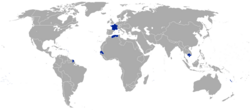French Second Empire
| French Empire | ||||||||||||||||
| Empire Français | ||||||||||||||||
|
||||||||||||||||
|
||||||||||||||||
|
Motto Liberté, égalité, fraternité "Liberty, Equality, Fraternity" |
||||||||||||||||
|
Anthem Partant pour la Syrie "Departing for Syria" |
||||||||||||||||
|
The French Empire in 1867.
|
||||||||||||||||
| Capital | Paris | |||||||||||||||
| Languages | French | |||||||||||||||
| Religion | Roman Catholic | |||||||||||||||
| Government | Unitary Constitutional Monarchy | |||||||||||||||
| Emperor | ||||||||||||||||
| • | 1852–1870 | Napoleon III | ||||||||||||||
| Cabinet Chief | ||||||||||||||||
| • | 1869–1870 | Émile Ollivier | ||||||||||||||
| • | 1870 | Charles de Palikao | ||||||||||||||
| Legislature | Parliament | |||||||||||||||
| • | Upper house | Senate | ||||||||||||||
| • | Lower house | Corps législatif | ||||||||||||||
| Historical era | New Imperialism | |||||||||||||||
| • | Coup of 1851 | 2 December 1851 | ||||||||||||||
| • | Constitution adopted | 14 January 1852 | ||||||||||||||
| • | Franco-Prussian War | 19 July 1870 | ||||||||||||||
| • | Battle of Sedan | 1 September 1870 | ||||||||||||||
| • | Republic proclaimed | 4 September 1870 | ||||||||||||||
| Currency | French franc | |||||||||||||||
|
||||||||||||||||
| Today part of |
|
|||||||||||||||
The Second French Empire (French: Le second empire français) was the Imperial Bonapartist regime of Napoleon III from 1852 to 1870, between the Second Republic and the Third Republic, in France.
The structure of the French government during the Second Empire was little changed from the First. But Emperor Napoleon III stressed his own imperial role as the foundation of the government. If government was to guide the people toward domestic justice and external peace, it was his role as emperor, holding his power by universal male suffrage and representing all of the people, to function as supreme leader and safeguard the achievements of the revolution. He had so often, while in prison or in exile, chastised previous oligarchical governments for neglecting social questions that it was imperative France now prioritize their solutions. His answer was to organize a system of government based on the principles of the "Napoleonic Idea." This meant that the emperor, the elect of the people as the representative of the democracy, ruled supreme. He himself drew power and legitimacy from his role as representative of the great Napoleon I of France, "who had sprung armed from the French Revolution like Minerva from the head of Jove."
The anti-parliamentary French Constitution of 1852 instituted by Napoleon III on 14 January 1852, was largely a repetition of that of 1848. All executive power was entrusted to the emperor, who, as head of state, was solely responsible to the people. The people of the Empire, lacking democratic rights, were to rely on the benevolence of the emperor rather than on the benevolence of politicians. He was to nominate the members of the council of state, whose duty it was to prepare the laws, and of the senate, a body permanently established as a constituent part of the empire.
One innovation was made, namely, that the Legislative Body was elected by universal suffrage, but it had no right of initiative, all laws being proposed by the executive power. This new political change was rapidly followed by the same consequence as had attended that of Brumaire. On 2 December 1852, France, still under the effect of Napoleon's legacy, and the fear of anarchy, conferred almost unanimously by a plebiscite the supreme power, with the title of emperor, upon Napoleon III.
...
Wikipedia



